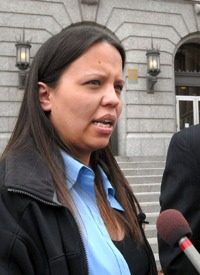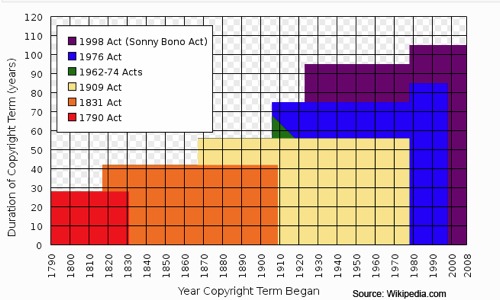
“The Obama administration told a federal judge Friday the $1.92 million jury verdict against a Minnesota woman for sharing 24 music tracks on Kazaa was constitutionally sound,” Wired.com reported on August 14, “despite defense claims it was unconstitutionally excessive.”
And as a civil — rather than a criminal — matter, it certainly was excessive. The judge in the case had earlier instructed the jury (an instruction struck down on appeal) that the woman, Jammie Thomas-Rasset, need not have had anyone actually download a song from her Kazaa account in order to qualify for damages up to $150,000 per song.
“The current damages range provides compensation for copyright owners because, inter alia, there exists situations in which actual damages are hard to quantify,” the Obama administration’s attorneys wrote in a court brief. “Furthermore, in establishing that range, Congress took into account the need to deter the millions of users of new media from infringing copyrights in an environment where many violators believe that they will go unnoticed.”
The problem with that statement is that civil suits were originally designed for recovering damages, while criminal suits are designed for deterrence. The current copyright law, the so-called Sonny Bono Act of 1998, almost has it in reverse. Criminal charges are almost never filed in practice, while civil suits by the recording industry is the general method of “deterrence” that has no connection to actual damages.
The U.S. Constitution does allow Congress to pass laws to protect copyrights and patents, but the current law goes far beyond the constitutional authorization. Article I, Section 8 reads, “Congress shall have the power … to promote the progress of science and useful arts, by securing for limited times to authors and inventors the exclusive right to their respective writings and discoveries.” The power of Congress to issue copyrights and patents is restricted to “limited times” and to the promotion of “progress of science and useful arts.” The U.S. Constitution makes no pretense that an author "owns" his work; it only states that there is a public purpose in giving him a limited time to enjoy exclusive commercial duplication of it.
When the Founding Fathers established copyright protections, they gave authors a long 28 years of exclusivity for their writings. It was a long time, but it was still a limited time. Today, copyright protection extends more than 100 years, a virtual eternity. The extension of copyright over the years (see the chart below) has had nothing to do with promoting the arts and sciences and everything to do with the lobbying efforts of greedy corporate behemoths in Hollywood and the music industry buying up copyrights and trying to keep them out of the public domain forever.

Current copyright law is actually inhibiting the development of technology, often because of Hollywood and the music recording industry. The recording industry’s hold on the law has even led to the banning of new digital recording technologies being introduced, with a federal judge banning the sale of Real Networks’ DVD copying software on August 11. The same judge also banned sale of a similar technology by Kaleidescape the next day.
Real Networks is in the process of suing the major Hollywood recording studios on antitrust grounds. After all, why should the corporate elite be the only ones who can copy their own DVDs?
Nobody decides not to write a novel or produce a play because they would only get 28 years of copyright protection instead of 100-plus years. But in the intervening time between the Founding Fathers and today, the law has more emulated the globalist 1886 Berne Convention for the Protection of Literary and Artistic Works than the vision of the Founders.
This movement that arose out of the Berne Convention adopted an absurd new term called “intellectual property.” When children are very young, they often sing songs, and when someone else sings the same song, they object saying, “No, that’s my song. You can’t sing it.” While most people grow up, the corporate megacorporations in the recording industry have not. The whole idea of recording a work or writing a book is for the work to be heard or the book to be read, but the gigantic recording industry is geared toward restricting access to works. They are still clinging to the idea that no one else can sing their song … ever. It’s their “property," just like the four- and five-year-old children’s arguments. Passing works into the public domain, even 100 years out and long after the death of the author, is "theft" to the recording industry megaliths. The result is that the copyright exception to the general American policy of free trade is strangling trade.
The whole copyright insanity has gone so far off the constitutional reservation that a number of years ago the Wall Street Journal ran a front page story about the grandchildren — grandchildren — of the author of the song “My Buddy,” who were whining about how their grandfather’s song had passed into the public domain. The grandfather had long passed on, the song had been written in 1922, but the grandchildren claimed they had been robbed of their “property” and weren’t getting royalties from the song. They had the audacity to complain, despite the fact that none of them had any role in producing the song and their grandfather had more than 50 years of copyright protection from the song. Naturally, the Wall Street Journal gave them sympathetic treatment.
The recent absurd jury verdicts in music cases reveal that copyright law needs to be pared down to the level that the Constitution proscribes.



